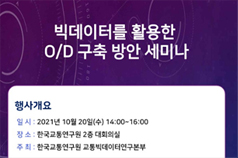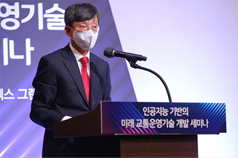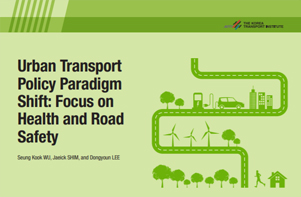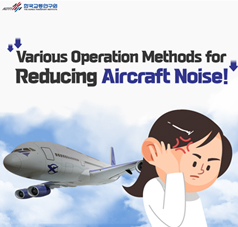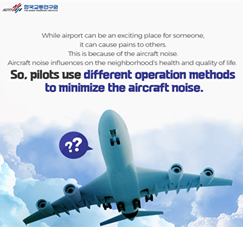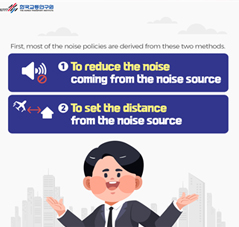Newsletters

NEWS
KOTI - Korea Transport institute
Feeds and Updates
KOTI NEWSLETTER Nov, 2021
November 12 2021
2021 11

Special Interview
Interview with Eastern Asia Society for Transportation Studies (EASTS, KOTI) President Dr. JAEHAK OH
"The future of transport service responding to COVID19 pandemic is going to be upgraded towards more human-centred. Human-centred transport means more individual customized mobility service, especially for elderly, avoiding health risks, promoting reduction of carbon emissions, and improving transport safety level."
Major events of the month
KOTI Held 'Debate for the Integration of Urban Air Mobility (UAM) Into the Transportation System'
<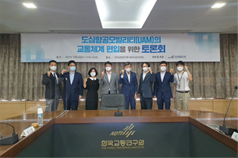

The Korea Transport Institute (KOTI) held the '5th International Electric and Automated Mobility Forum' as a separate session on Thursday, September 9th at the 8th International Electric Vehicle Expo held at Jeju International Convention Center (ICC JEJU) from Tuesday, September 7th to Friday, September 10th.
Starting with the opening remarks by Oh Jaehak, President of The Korea Transport Institute, the forum, which was followed by a welcoming speech by Mun Daerim, Chairman of JDC, and a congratulatory speech by Kim Daehwan, Chairman of the Global EV Association Network, was held under the themes of "Self-driving Policies and Future Vision" and "Empirical Cases for Self-driving-based Development and Services."
Starting with the opening remarks by Oh Jaehak, President of The Korea Transport Institute, the forum, which was followed by a welcoming speech by Mun Daerim, Chairman of JDC, and a congratulatory speech by Kim Daehwan, Chairman of the Global EV Association Network, was held under the themes of "Self-driving Policies and Future Vision" and "Empirical Cases for Self-driving-based Development and Services."
KOTI Held 'Seminar on How to Build O/D Using Big Data'
The KOTI held a 'Seminar on How to Build O/D Using Big Data' at its conference room on the 2nd floor on Wednesday, October 20th. Following the presentation of Jo Jongseok, Research Fellow, and Won Minsu, Associate Research Fellow of KOTI, experts such as Professor Chu Sangho of Hongik University, Professor Jeong Seongbong of Seoul National University of Science and Technology, Professor Son Gimin of Chung-Ang University, and Eom Jingi, Senior Researcher at Korea Railroad Research Institute, attended as panelists to exchange opinions on mobile data-based travel behavior analysis technology and travel survey, and passenger O/D transmission plan using big data with Professor Kim Ikgi of Hanyang University as chair.
KOTI Signed MOU With LG Uplus Corp.
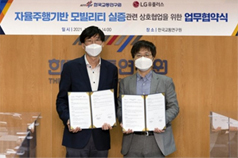
The KOTI (Jang Wonjae, director general of Department of Comprehensive Transport) signed MOU with LG Uplus Corp. (Ju Yeongjun, Director of Next Generation Technology Lab) at its meeting room on the 2nd floor on Monday, October 25th. Based on the synergy of LG Uplus Corp.'s 5G communication and dynamic map and KOTI's road and traffic data, the MOU is expected to contribute to the growth of the mobility industry and to develop autonomous mobility infrastructure technology by sharing experience and know-how related to pilot projects, cooperating for public data support for the expansion of mobility services, and finding data-based mobility policies.
KOTI Held 'Seminar on the Development of Future Transportation Operation Technology Based on Artificial Intelligence'
The KOTI held a 'Seminar on the Development of Future Transportation Operation Technology Based on Artificial Intelligence' at COEX's Grand Ballroom (Gangnam-gu, Seoul) on Wednesday, October 27th. Hosted by the Korea Agency for Infrastructure Technology Advancement and organized by the KOTI, the seminar was planned to share the core achievements of the R&D project since 2018, collect various opinions, and put the developed new transportation operation technology into practical use in the field. Starting with the opening remarks of Oh Jaehak, president of Korea Transport Institute, future-oriented transportation operation plans such as development directions and use cases of various transportation technologies were presented and the status of transportation platform development based on Living Lab was shared in the event, while representatives from relevant departments and experts participated as panelists and had time to discuss and listen to opinions for efficient transportation operation.
2021 Basic Research
Supply policy change and effect analysis of logistics facilities and improvement plan
- Purpose
-
- To compare and verify the distribution of standard logistics facilities and supporting warehouse facilities before and after the implementation of a location limit system and an actual demand verification system for logistics complexes
- To verify the major location determinants of logistics complexes and supporting warehouse facilities
- To verify accessibility to transportation and logistics infrastructure and a consumer market
- Major Research Contents
-
- Analysis of location determinants of logistics complexes and warehouse facilities
- Analysis of the status of approval, construction, and operation of logistics complexes and warehouse facilities
- Analysis and evaluation of location determinants of logistics complexes and ware-house facilities
- Proposal for improvement of the actual demand verification system
Research on the establishment of an underground logistics system for the advancement of the future logistics environment
- Purpose
-
- To prepare a strategy to utilize urban space and to build an underground logistics system in response to daily logistics demand to innovate the urban logistics system
- To suggest a direction for building a future cargo transportation system that vertically expands the scope of space utilization for cargo transportationsta-tus of the air transport market in Korea
- Major Research Contents
-
- Establishment of the concept of an underground logistics system in preparation for the advancement of the future logistics environment
- Analysis of the current status and problems of daily logistics in Korea
- Vision of the future logistics environment according to the development of daily logistics
- Direction of construction of the underground logistics system for advancement of future logistics environment
Basic Research Reports
Urban Transport Policy Paradigm Shift: - Focus on Health and Road Safety -
While the invention of automobile transportation was innovative with regard to the possibility of door-to-door mobility instead of mobility through railroads, it also brought about negative impacts such as damage to life and property due to traffic accidents and health impacts due to air pollution.
Metropolitan transportation centered upon automobiles resulted in issues such as slower traffic flow, an increased rate in traffic accidents, and particulate matter discharged by automobiles.
Multiple countries have changed their urban transport system to be focused on people instead of cars [Woonerf, Netherlands (the 1970s), Sustainable Development (the 1990s), Smart Growth, Transit Oriented Development, Compact City (the 2000s)].
Korea has experienced remarkable economic growth since the 1990s, and citizens are interested in their quality of life, including safety and health. However, urban transportation policy focuses on the rapid movement of cars.
Multiple countries have changed their urban transport system to be focused on people instead of cars [Woonerf, Netherlands (the 1970s), Sustainable Development (the 1990s), Smart Growth, Transit Oriented Development, Compact City (the 2000s)].
Korea has experienced remarkable economic growth since the 1990s, and citizens are interested in their quality of life, including safety and health. However, urban transportation policy focuses on the rapid movement of cars.
370 Sicheong-daero, Sejong-si, 30147, Republic of Korea
TEL. 044-211-3114 FAX. 044-211-3222
Copyrightⓒ THE KOREA TRANSPORT INSTITUTE All rights reserved

Click here to receive traffic research trends and news about researchers through KakaoTalk.

